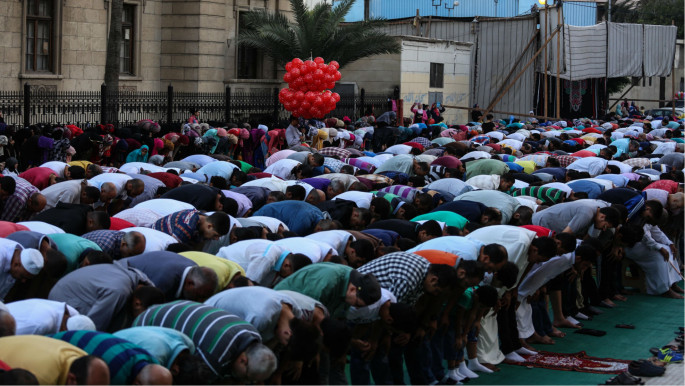Protesters killed by police 'not martyrs' says Egypt's mufti
Protesters killed by police 'not martyrs' says Egypt's mufti
Egypt's highest official of religious law has said that protesters killed by police in illegal demonstrations are not "martyrs", as authorities continue attempts to suppress calls for renewed anti-government protests.
2 min read
The mufti made the ruling as public outrage rises ahead of the revolution's anniversary [Getty]
Egypt's grand mufti has decreed that people killed during unauthorised protests are not considered "martyrs", as the government steps up its efforts to suppress demonstrations from taking place on the anniversary of the 2011 revolution.
"The title 'martyr' is given to Muslims who die during battle or are killed by enemies," Shawki Allam said, when questioned on whether slain protesters could be called "martyrs".
"Those who protest or hold sit-ins legally and are killed in accidents can be called martyrs, unless they were aggressors, or the causes of their deaths were sinful or in violation of the law such as inciting sedition, assaulting people or public or private property," Allam told al-Araby al-Jadeed's Arabic service.
"They are not martyrs. They cannot be given this honourable title," he added.
On Monday, the grand mufti's consultant, Ibrahim Negm, repeated Allam's ruling, saying that protesters killed by security forces in unauthorised rallies could not be considered martyrs.
Last week, Egypt's ministry of religious endowments issued a model Friday sermon across the country for preachers to urge mosque-goers to ignore "destructive calls to destabilise the nation", referring indirectly to the protests on January 25.
Police have also tried to deter possible protesters from heading to the streets once again.
Police chief Medhat al-Minshawi recently said: "Anyone who thinks about breaking the law or terrorising peaceful citizens on January 25 can only blame themselves for what happens. We are prepared to sacrifice our lives to protect the county."
A recent string of highly publicised deaths and torture in police custody have fuelled public outrage as the fifth anniversary of the January 25 revolution approaches.
Long-running police abuses, including the brutal killing of a young man in 2010 at the hands of two policemen, fuelled the 18-day uprising that overthrew president Hosni Mubarak in 2011.
Mubarak was succeeded in 2012 by the Muslim Brotherhood's Mohamed Morsi, who lasted a year in power before he was ousted by the military following massive rallies demanding the Islamist's resignation.
"The title 'martyr' is given to Muslims who die during battle or are killed by enemies," Shawki Allam said, when questioned on whether slain protesters could be called "martyrs".
 |
|
| The content of Friday sermons are controlled by the state [Getty] |
"They are not martyrs. They cannot be given this honourable title," he added.
On Monday, the grand mufti's consultant, Ibrahim Negm, repeated Allam's ruling, saying that protesters killed by security forces in unauthorised rallies could not be considered martyrs.
Last week, Egypt's ministry of religious endowments issued a model Friday sermon across the country for preachers to urge mosque-goers to ignore "destructive calls to destabilise the nation", referring indirectly to the protests on January 25.
Police have also tried to deter possible protesters from heading to the streets once again.
Police chief Medhat al-Minshawi recently said: "Anyone who thinks about breaking the law or terrorising peaceful citizens on January 25 can only blame themselves for what happens. We are prepared to sacrifice our lives to protect the county."
A recent string of highly publicised deaths and torture in police custody have fuelled public outrage as the fifth anniversary of the January 25 revolution approaches.
Long-running police abuses, including the brutal killing of a young man in 2010 at the hands of two policemen, fuelled the 18-day uprising that overthrew president Hosni Mubarak in 2011.
Mubarak was succeeded in 2012 by the Muslim Brotherhood's Mohamed Morsi, who lasted a year in power before he was ousted by the military following massive rallies demanding the Islamist's resignation.





 Follow the Middle East's top stories in English at The New Arab on Google News
Follow the Middle East's top stories in English at The New Arab on Google News


